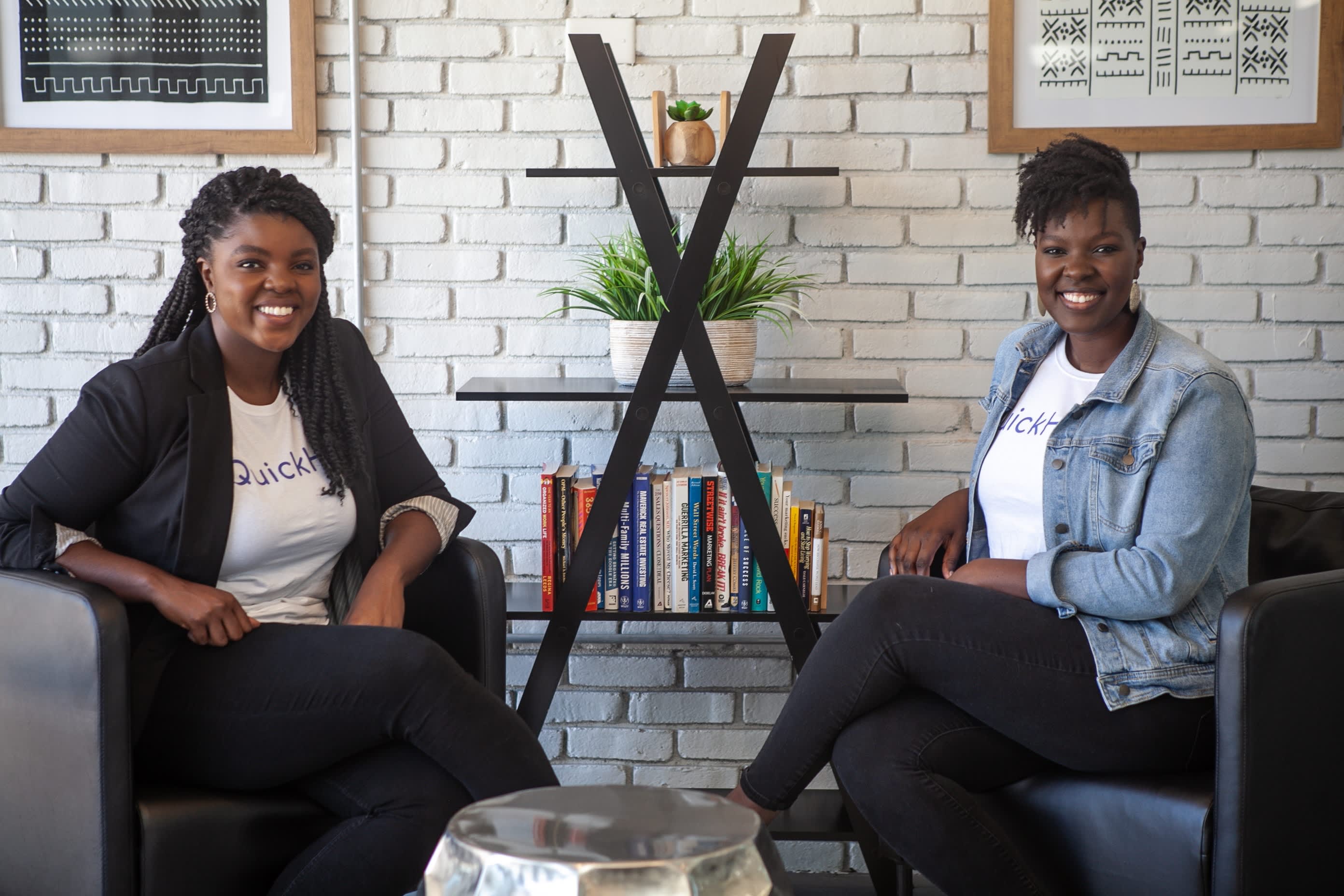Deborah Gladney, 34, and Angela Muhwezi-Hall, 32, are part of a small but growing club of million-dollar Black female founders.
The sisters are the creators behind QuickHire, a hiring platform that connects workers to service and skilled-trade jobs. In November, QuickHire raised $1.41 million in an oversubscribed round of funding, making Gladney and Muhwezi-Hall the first Black women in Kansas to raise over $1 million for a startup, according to AfroTech.
It’s a feat for any entrepreneur, but especially when you consider that Black female startup founders received just 0.34% of the total $147 billion in venture capital invested in U.S. startups through the first half of 2021, according to Crunchbase.
When the sisters started their venture in March 2020, Gladney was pregnant with her third child, and Muhwezi-Hall ended up in the hospital after contracting Covid-19. They weathered uncertainties of the pandemic, saw racial unrest during the George Floyd protests, penny-pinched to invest $50,000 of their own savings, and experienced microaggressions while fundraising. A beta version of QuickHire launched in the fall of 2020, and they released a finished product to the public in April 2021.
Today, QuickHire matches more than 11,000 job seekers with jobs at 60 mid- to large-size service industry companies in the Wichita, Kansas, and Kansas City metro areas. During the Great Resignation, QuickHire data is also proving how businesses must provide better jobs to the working class — jobs with good pay, stable hours, health insurance and future careers — if they ever hope to fill openings.
CNBC Make It spoke with the two sisters for their best career advice, and how it helped them launch their very first $1 million business.
‘Don’t ever let anybody see you sweat’
The biggest piece of career advice Gladney takes to heart comes from a former boss: “Don’t ever let anybody see you sweat.”
“There’s just so much power in not giving other people the power in knowing that they won any situation over you,” Gladney says.
Gladney says the experience of pitching QuickHire and raising money hasn’t been without experiencing bias and microaggressions — situations “where people have said or done something where, if we’d shown them they got to us, I think they would have succeeded in stopping us.”
Gladney remembers pitching to investors and feeling like they had “every card stacked against us.” They applied to but got turned away from accelerator programs, “and it left a bad taste in our mouths. The reasons for why we were turned down just weren’t very clear. And it made us wonder, is it because we’re Black women doing this?”
It’s an all-too-common scenario for women and founders of color in the VC world, where the majority of investors are white men. “We felt like we had to come to the table with more revenue or more validation than our counterparts, because we knew that we weren’t going to be able to raise if we didn’t make it even more comfortable for [investors] to take a chance on us,” Gladney says.
Gladney and Muhwezi-Hall nearly gave up on trying to get into an accelerator program until they had one motivating meeting with a managing director with the accelerator TechStars Iowa. They got into the accelerator, and their growth took off.
Gladney says she relies on a few core people, including her sister, her husband and her father, to manage the frustrations that come with being a Black female founder in the tech space.
“They get it all from me,” she says, “but it helps me go out there and fight the world.”
‘You’ve got to go to grow’
Muhwezi-Hall says the best advice she’s ever gotten was that you have to “go to grow.”
“Sometimes in life, and especially in careers, for you to find those opportunities of advancement and to widen your horizon, you have to get out of your comfort zone,” she says. “You have to take a chance on yourself.”
For Muhwezi-Hall’s part, the seeds for QuickHire were actually planted back in 2017, when she was a college and career counselor at a Los Angeles high school. She had plenty of resources to offer to those bound for college, but few for students headed to service or skilled trade jobs. Roughly 108 million people, or 71% of the labor force, work in the service sector — why weren’t there better ways to connect them with stable careers other than filling out paper job applications?
“This was an idea that we sat on for so many years,” Muhwezi-Hall says, adding that Gladney often encouraged her to bring it to life. The urgency of the pandemic, when she saw tens of millions of service workers losing their jobs, caused her to reprioritize her idea.
Muhwezi-Hall and Gladney got to work on building QuickHire in March 2020. By August, Muhwezi-Hall moved with her husband from L.A. into Gladney’s basement in Wichita, Kansas, for seven months to continue building. Muhwezi-Hall and her husband have since relocated to Chicago, and the sisters work together remotely and during in-person visits.
“At some point, you have to move,” she says. “And if you are afraid to move, you’ll never grow. So that’s something that I apply to everything: You’ve got to go to grow.”
Check out:
This 29-year-old launched a business to support Black NFT artists—and it made $140,000 in 10 months
Co-founder of $1.6 billion brand Skims: ‘I have a rule — you have to do things that scare you’
Sign up now: Get smarter about your money and career with our weekly newsletter
